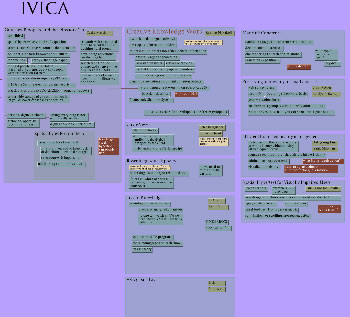IVICA: all your stuff
There's no economic need to throw stuff out; it is less expensive to keep things indefinitely than to take the time needed to decide what to keep and what to throw out. But Cathy Marshall's fascinating keynote at IVICA raised a host of questions about the way people actually cope with all their digital stuff.
Cathy has been going to people and exploring all the digital stuff they have and how they work with it. The corners of their hard disks, the seldom-used old computers in the kid's room or the attic, the pile of old CDs in the desk drawer: everything. This reveals some very interesting lessons:
- Backups and archives are different things. You backup your working set -- the things you use all the time. You also need to have a strategy for preserving stuff you don't actually use, but still want to keep.
- Re-encounter matters. "When I'm old, this copy of High Life will remind me of my backpacking trip to Amsterdam when I was 21, I'll put it in the steamer trunk. "
- Librarians say that a misshelved book is a lost book. But people take comfort from knowing (or believing) that some of their digital stuff is 'around here somewhere', even if they aren't sure exactly where it is.
- The fact that there's no compelling economic need to delete stuff doesn't mean you want to keep everything. For example, you might not want to keep all your ex-husband's stuff. It's not that you care about the expense of storing it; you might actively want not to have it anymore.
Cathy also had a wonderful discussion of how "an anonymous referee who happens to be in the room today" (me) had disagreed with one of her earlier papers on digital preservation, and my the referee was wrong. I argued, in essence, that preservation is fairly easy for anything that has an audience, and anything that doesn't get looked at every generation or so is going to get lost whatever we do. Cathy's refutation, in essence, is the box of family photos in the back of the closet: you don't especially want to take it down right now and look at pictures of Aunt Tillie's prom dress right now, but it's nice to know you have that box even if the next time it's opened is when your kids are packing up after the funeral.
Here's my Tinderbox map from IVICA. One thing we need to understand better, I think, is how note-taking impacts understanding, concentration, and memory. I find that sketchy Tinderbox notes help me focus in ways that paper notes did not.
